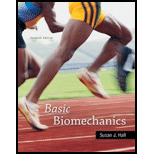
Basic Biomechanics
7th Edition
ISBN: 9780073522760
Author: Susan J Hall
Publisher: McGraw-Hill Education
expand_more
expand_more
format_list_bulleted
Concept explainers
Question
Chapter 6, Problem 3AP
Summary Introduction
To hypothesize: The biomechanical characteristics of the muscles of kangaroos and cats.
Concept introduction: Muscle tissue is a well-vascularized soft tissue present in the muscles of animal body. It consists of specialized cells known as myocytes (contain contractile proteins) that are generally attached with bones, which enable the movement of the various parts of the body. Certain animals use jumping for locomotion or climbing or escaping from predators.
Expert Solution & Answer
Want to see the full answer?
Check out a sample textbook solution
Knowledge Booster
Learn more about
Need a deep-dive on the concept behind this application? Look no further. Learn more about this topic, bioengineering and related others by exploring similar questions and additional content below.Similar questions
- Why do you think a person is able to perform anaerobic exercise (such as lifting and holding a heavy weight) only briefly but can sustain aerobic exercise (such as walking or swimming) for long periods? (Hint: Muscles have limited energy stores.)arrow_forwardYou are training athletes for the 100-meter dash. They need muscles specialized for speed and strength, not endurance. What muscle characteristics would your training regimen aim to develop? How would you alter it to train a long-distance swimmer?arrow_forwardWhat is a motor unit? Why does a rapid series of muscle twitches yield a stronger overall contraction than a single twitch?arrow_forward
- Electromyography is a diagnostic test that measures the electrical activity within muscle fibers. _______________ _______________ _______________ _______________arrow_forwardFigure 38.37 Which of the following statements about muscle contraction is true? The power stroke occurs when ATP is hydrolyzed to ADP and phosphate. The power stroke occurs when ADP and phosphate dissociate from the myosin head. The power stroke occurs when ADP and phosphate dissociate from the actin active site. The power stroke occurs when Ca2+ binds the calcium head.arrow_forwardWhich component is responsible for initially stimulating a muscle contraction? a. proteins b. electrochemical signals c. plasma membranes d. striationsarrow_forward
- Watch this video (http://openstaxcollege.org/l/micromacro) to learn more about macro- and microstructures of skeletal muscles. (a) What are the names of the junction points between sarcomeres? (b) What are the names of the subunits within the myofibrils that run the length of skeletal muscle fibers? (c) What is the “double strand of pearls� described in the video? (d) What gives a skeletal muscle fiber its striated appearance?arrow_forwardWhich arrangement best describes a bipennate muscle? The muscle fibers feed in on an angle to a long tendon from both sides. The muscle fibers feed in on an angle to a long tendon horn all directions. The muscle fibers feed in on an angle to a long tendon horn one side. The muscle fibers on one side of a tendon feed into it at a certain angle and muscle fibers on the other side of the tendon feed into it at the opposite angle.arrow_forwardAfter death, a person no longer makes ATP, so calcium stored in the sarcoplasmic reticulum diffuses down its concentration gradient into the muscle cytoplasm. This result is rigor mortis----an unbreakable state of muscle contraction that stiffens the body for a few days until muscles begin to decay. Explain why this contraction occurs.arrow_forward
- In a rock climber like the man pictured in Figure 14.25, which organs of equilibrium are activated? Figure 14.25 Dangling upside down affects several organs of equilibrium. What are they?arrow_forwardA muscle that has a pattern of fascicles running along the long axis of the muscle has which of the following fascicle arrangements? circular pennate parallel rectusarrow_forwardHow does a muscle fiber incur an oxygen debt?arrow_forward
arrow_back_ios
SEE MORE QUESTIONS
arrow_forward_ios
Recommended textbooks for you
 Human Biology (MindTap Course List)BiologyISBN:9781305112100Author:Cecie Starr, Beverly McMillanPublisher:Cengage Learning
Human Biology (MindTap Course List)BiologyISBN:9781305112100Author:Cecie Starr, Beverly McMillanPublisher:Cengage Learning Human Physiology: From Cells to Systems (MindTap ...BiologyISBN:9781285866932Author:Lauralee SherwoodPublisher:Cengage Learning
Human Physiology: From Cells to Systems (MindTap ...BiologyISBN:9781285866932Author:Lauralee SherwoodPublisher:Cengage Learning Comprehensive Medical Assisting: Administrative a...NursingISBN:9781305964792Author:Wilburta Q. Lindh, Carol D. Tamparo, Barbara M. Dahl, Julie Morris, Cindy CorreaPublisher:Cengage Learning
Comprehensive Medical Assisting: Administrative a...NursingISBN:9781305964792Author:Wilburta Q. Lindh, Carol D. Tamparo, Barbara M. Dahl, Julie Morris, Cindy CorreaPublisher:Cengage Learning

Human Biology (MindTap Course List)
Biology
ISBN:9781305112100
Author:Cecie Starr, Beverly McMillan
Publisher:Cengage Learning

Human Physiology: From Cells to Systems (MindTap ...
Biology
ISBN:9781285866932
Author:Lauralee Sherwood
Publisher:Cengage Learning

Comprehensive Medical Assisting: Administrative a...
Nursing
ISBN:9781305964792
Author:Wilburta Q. Lindh, Carol D. Tamparo, Barbara M. Dahl, Julie Morris, Cindy Correa
Publisher:Cengage Learning


